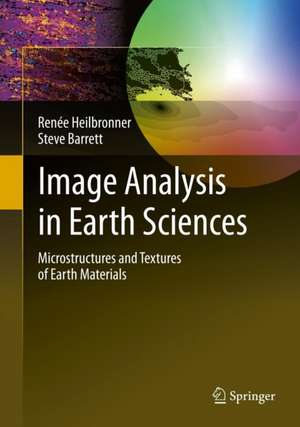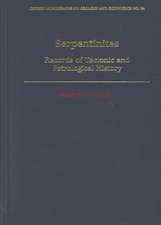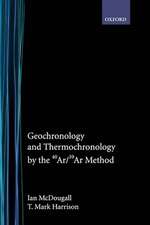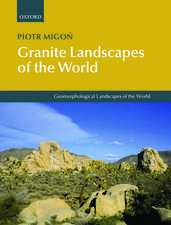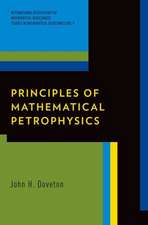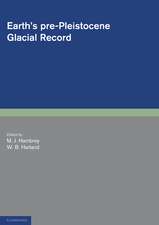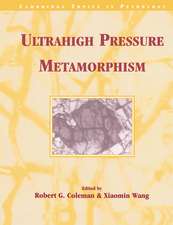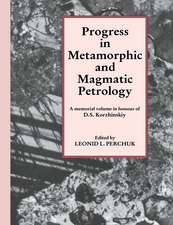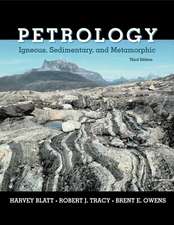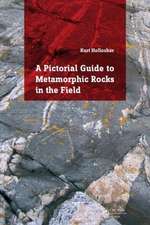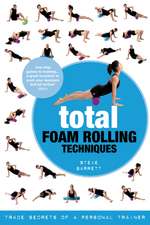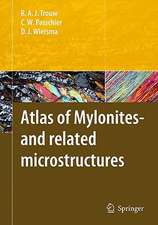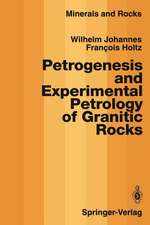Image Analysis in Earth Sciences: Microstructures and Textures of Earth Materials
Autor Renée Heilbronner, Steve Barretten Limba Engleză Hardback – 28 iul 2013
| Toate formatele și edițiile | Preț | Express |
|---|---|---|
| Paperback (1) | 815.13 lei 38-44 zile | |
| Springer Berlin, Heidelberg – 30 sep 2016 | 815.13 lei 38-44 zile | |
| Hardback (1) | 993.43 lei 22-36 zile | |
| Springer Berlin, Heidelberg – 28 iul 2013 | 993.43 lei 22-36 zile |
Preț: 993.43 lei
Preț vechi: 1211.49 lei
-18% Nou
Puncte Express: 1490
Preț estimativ în valută:
190.15€ • 206.62$ • 159.83£
190.15€ • 206.62$ • 159.83£
Carte disponibilă
Livrare economică 31 martie-14 aprilie
Preluare comenzi: 021 569.72.76
Specificații
ISBN-13: 9783642103421
ISBN-10: 3642103421
Pagini: 540
Ilustrații: XIX, 520 p. 596 illus., 257 illus. in color.
Dimensiuni: 178 x 254 x 38 mm
Greutate: 1.82 kg
Ediția:2014
Editura: Springer Berlin, Heidelberg
Colecția Springer
Locul publicării:Berlin, Heidelberg, Germany
ISBN-10: 3642103421
Pagini: 540
Ilustrații: XIX, 520 p. 596 illus., 257 illus. in color.
Dimensiuni: 178 x 254 x 38 mm
Greutate: 1.82 kg
Ediția:2014
Editura: Springer Berlin, Heidelberg
Colecția Springer
Locul publicării:Berlin, Heidelberg, Germany
Public țintă
ResearchCuprins
Part I Looking at Images.- 1 Images and Microstructures.- 2 Acquiring Images.- 3 Digital Image Processing.- 4 Pre-processing.- Part II Segmentation: Finding and Defining the Object.- 5 Segmentation by Point Operations.- 6 Post-processing.- 7 Segmentation by Neighborhood Operations.- 8 Image Analysis.- 9 Test Images.- Part III Measuring Size and Volume.- 10 Volume Determinations.- 11 2-D Grain Size Distributions.- 12 3-D Grain Size.- 13 Fractal Grain Size Distributions.- Part IV Quantifying Shape and Orientation.- 14 Particle Fabrics.- 15 Surface Fabrics.- 16 Strain Fabrics.- 17 Shape Descriptors.- Part V Spatial Relationships.- 18 Spatial Distributions.- 19 Spatial Frequencies.- 20 Autocorrelation Function.- Part VI Orientation Imaging.- 21 Crystal Orientation and Interference Color.- 22 Computer-Integrated Polarization Microscopy.- 23 Orientation and Misorientation Imaging.- Index.
Notă biografică
Professor Renée Heilbronner has many years of experience in the field of image analysis and has developed several software packages for microstructure analysis for grain size, shape and strain determinations. She has also developed the CIP method for crystallographic texture determinations and orientation imaging based on polarization microscopy and digital image processing. She has contributed to the development of the freeware image analysis software (Image SXM, former NIH Image), and is a member of a growing group of international image analysis experts who are setting up workshops and building a network for microstructure and texture research involving mathematicians, material scientists and geologists. As an experienced teacher of image analysis at different levels ranging from general introductory courses to specialized texture workshops, she has taught at various universities all over the world.
http://pages.unibas.ch/earth/micro
Dr Steve Barrett is the author of the internationally renowned image analysis software Image SXM. He has been developing the software continuously over the past two decades, from its origins as a spin-off from the freeware NIH Image, to the extensions that allow it to handle images from over fifty types of optical and scanning microscopes. A customized version of this software (PrinCIPia) based on the CIP method can handle the calculation, display, analysis and manipulation of images representing the crystallographic orientation of grains in rock samples imaged by polarizing microscopes. He has published widely in the field of nanoscience and has also collaborated with medics to create microscopy image analysis software for medical applications (MIASMA). He has over twenty years experience teaching to undergraduates and postgraduates. http://www.liv.ac.uk/~sdb
http://pages.unibas.ch/earth/micro
Dr Steve Barrett is the author of the internationally renowned image analysis software Image SXM. He has been developing the software continuously over the past two decades, from its origins as a spin-off from the freeware NIH Image, to the extensions that allow it to handle images from over fifty types of optical and scanning microscopes. A customized version of this software (PrinCIPia) based on the CIP method can handle the calculation, display, analysis and manipulation of images representing the crystallographic orientation of grains in rock samples imaged by polarizing microscopes. He has published widely in the field of nanoscience and has also collaborated with medics to create microscopy image analysis software for medical applications (MIASMA). He has over twenty years experience teaching to undergraduates and postgraduates. http://www.liv.ac.uk/~sdb
Textul de pe ultima copertă
Image Analysis in Earth Sciences is a graduate level textbook for researchers and students interested in the quantitative microstructure and texture analysis of earth materials. Methods of analysis and applications are introduced using carefully worked examples. The input images are typically derived from earth materials, acquired at a wide range of scales, through digital photography, light and electron microscopy. The book focuses on image acquisition, pre- and post-processing, on the extraction of objects (segmentation), the analysis of volumes and grain size distributions, on shape fabric analysis (particle and surface fabrics) and the analysis of the frequency domain (FFT and ACF). The last chapters are dedicated to the analysis of crystallographic fabrics and orientation imaging. Throughout the book the free software Image SXM is used.
Caracteristici
Introduces image analysis in the earth sciences, applicable to the full range of images generated from digital photography, light and electron microscopy
Much needed book for earth and material scientists as well as university teaching programmes
Based on free software Image SXM
Includes supplementary material: sn.pub/extras
Much needed book for earth and material scientists as well as university teaching programmes
Based on free software Image SXM
Includes supplementary material: sn.pub/extras
